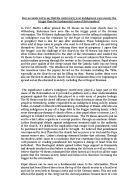How accurate is it to say that the controversy over indulgences were merely the trigger than the fundamental cause of Reformation?
How accurate is it to say that the controversy over indulgences were merely the trigger than the fundamental cause of Reformation?
In 1517 Martin Luther pinned the 95 theses on his local church door in Wittenberg. Historians have seen this as the trigger point of the German reformation. The 95 theses challenged the church over the selling of indulgences. An indulgence was the remission by the Pope of the temporal punishment in purgatory that is due for sins after absolution. These Indulgences were often sold at huge sums to people who want to rid them self’s of sin and bring themselves ‘closer to God’, by reducing there time at purgatory. I agree that the ‘trigger’ was the challenge of the church by the 95 theses, but there were other factors that contributed to the start of the reformation and enabled the 95 theses to have a large impact on society. It was not unknown that there was anticlericalism growing through the century in the German nation. Papal abuses and the poor quality of the clergy meant that the Catholic faith was not being carried out efficiently. The situation of the German states was not helped with the numerous taxes the papacy forced on the Germans including the Tithe, especially as the Church was not for filling its duty. Martin Luther ideas were also not the first to attack the church, but new humanist ideas were beginning to spread across the educated in society, including the writings of Erasmus.
The significance Luther's Indulgence controversy played a large part in the cause of the Reformation as it provided a platform and a clear understandable argument against the church that played to a wide array of peoples feelings. The 95 theses was the direct influence of the church trying to abuse the German people in Wittenberg. Luther responded to an indulgences being sold by Johann Tetzel, on behalf of Albrecht of Brandenburg, Archbishop of Mainz. Albrecht was selling indulgences to pay off a huge debt to the Fugger banking family, which arose through purchasing of church offices, a clear papal abuse of simony. Leo X selling it to rebuild St Peter’s cathedral in Rome. The 95 theses aimed to put an end to what Luther regards as a corrupt practice, through an academic debate. Luther theological debate against indulgences stemmed right to the authority of the church. He disliked the implication that escape from punishment could be purchased and forgiveness could be brought. He believed that punishment was imposed by God. Therefore the church has no power over God and the Pope cannot remove sins. Luther’s theology stemmed further that criticism. Through his studies Luther came to a conclusion that true repentance has nothing to do with penance or evading punishment but requires a change of heart from the individual. This theological debate gained Luther huge support as Humanists had already touched on this before in studying the old texts as well as reform. I believe that the 95 theses culminated the other factors as I touch on all the main points that the German society hated and believed in, therefore becoming the trigger for the reformation.








